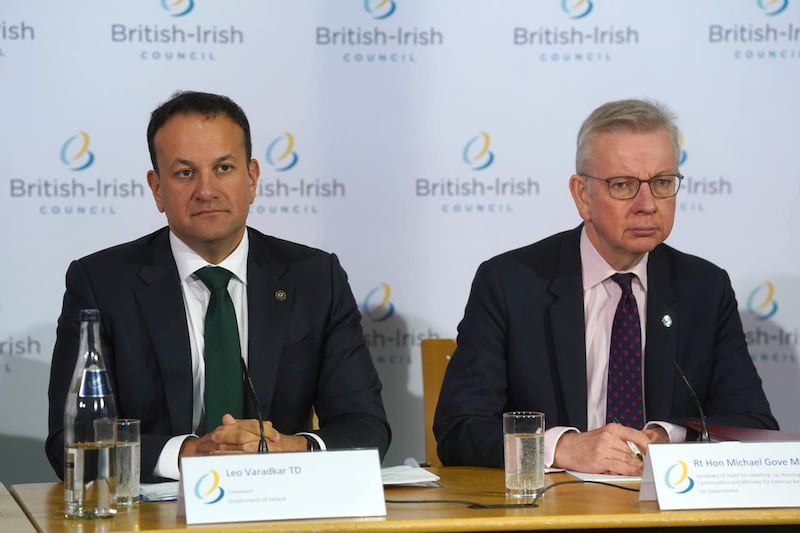As England’s Conservative party lurches rapidly to the right, regrettably followed by the Labour party, the person who has had most success in directing that lurch is Michael Gove.
Gove intends to foist a new definition of extremism on the British government this week despite being warned in no uncertain terms how damaging, divisive and discriminatory his plans will be.
One English commentator has described Gove as “the man who led the toxification of the Tories”. Other people make more noise, like Suella Braverman and the former deputy Conservative party chair, now Reform MP, the unspeakable Lee Anderson, but Gove has worked assiduously and successfully in government to stamp his Manichean view of British society on England.

He has been consistent in his right-wing views for decades, notably on Ireland in the 1990s. In 2000 he wrote a pamphlet for the right-wing Centre for Policy Studies entitled ‘Northern Ireland: The Price of Peace’, in which he absurdly described the Good Friday Agreement as “a Trojan horse”. He compared it to appeasing the Nazis or condoning the desires of paedophiles. He wrote that it was “a mortal stain and a humiliation for our army, police and parliament” ratified by a “rigged referendum”.
When he threw his hat in the ring for leadership of the Conservative party in 2016, his candidature caused alarm in Ireland. Luckily he was quickly eliminated.
By that time Gove had turned his attention to what he perceived as the Islamist threat to his notion of British values.
- Perfidious Albion and the trashing of the Good Friday Agreement – Brian FeeneyOpens in new window
- Red, white and blue command paper seeks to restore unionist veto at Stormont – Brian FeeneyOpens in new window
- https://www.irishnews.com/news/joe-brolly-to-represent-belfast-rappers-kneecap-in-legal-action-over-british-government-funding-block-VTA5LGHYURC3LDROUKLDY33SMI/Opens in new window
In a book published in 2006 entitled ‘Celsius 7/7′, referring to the London Tube and bus bombings, one chapter is called ‘Trojan Horse’, seemingly his favourite metaphor, this time identifying “rejectionist Islamist views” held by “a sizeable minority” of Britain’s (then) 1.8 million Muslims which he compared to the threat posed by Nazism and Communism.
Gove said he wrote the book because of a “widespread reluctance to acknowledge the real scale and nature of the Islamist terror threat” in Britain and “the failure to scrutinise, monitor or check the actions, funding and operation of those committed to spreading the Islamist word in Britain”.

Presumably his current plans are intended to rectify that position. However, Gove can’t just target Muslims so he needs a new definition of extremism, something, shall we say, ‘extremely’ difficult to define.
At the weekend three former home secretaries, Priti Patel, Sajid Javid and Amber Rudd, wrote an open letter to him also signed by a wide range of dignitaries including Lord Mann, the government’s independent advisor on antisemitism, and Lord Dannatt, former chief of the general staff. They warned Gove of the danger of politicising extremism by not seeking consensus with other political parties and religious groups when defining extremism and by concentrating on ideologies, which Gove plans to do, rather than on actions of groups.
The other pitfall is that Gove does not intend to place his definition on a statutory basis, but simply as guidelines for government departments and then extend the guidelines to councils. Officials have warned him that approach leaves his plans open to legal challenges based on religious and other discrimination, particularly in the current climate of gender wars.
He wrote a pamphlet entitled ‘Northern Ireland: The Price of Peace’ in which he absurdly described the Good Friday Agreement as ‘a Trojan horse’. He compared it to appeasing the Nazis or condoning the desires of paedophiles
You can already see that approach and its flaws in operation. Kemi Badenoch, who apparently has a close if fractious political relationship with Gove, stepped in last month to ban the Belfast rap trio Kneecap from receiving a funding award from the supposedly independent British Phonograph Industry. She said she couldn’t “hand taxpayers’ money to people who oppose the UK itself”. So, their ideology rather than their actions offends her.
The SNP in Holyrood might have something to say about discriminating against people opposing ‘the UK itself’. In the north of course, campaigning to end the UK is perfectly legal and under the terms of the Good Friday Agreement if people vote to kick Britain out, the British government is obliged to being in legislation to bring that about.
However, if Gove has his way in England, his guidelines will exclude groups and individuals who fall foul of his definition of extremism from all contact with government and official bodies, creating a barrier between government and society. Let’s hope his plans stay in England.




